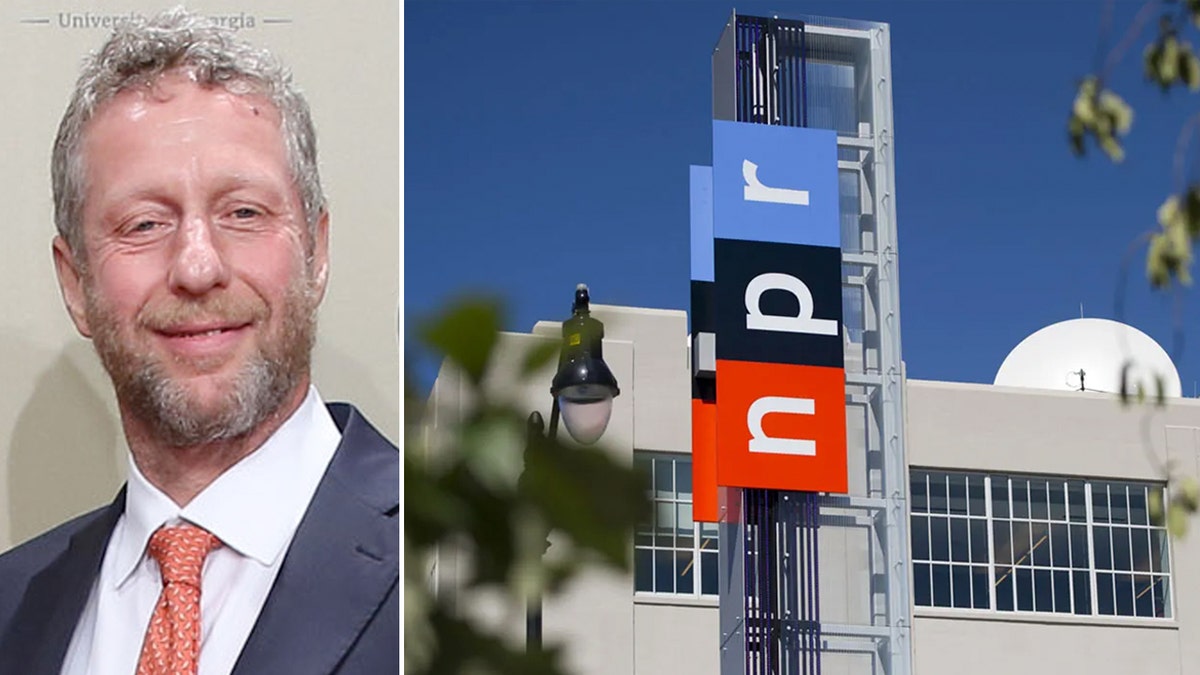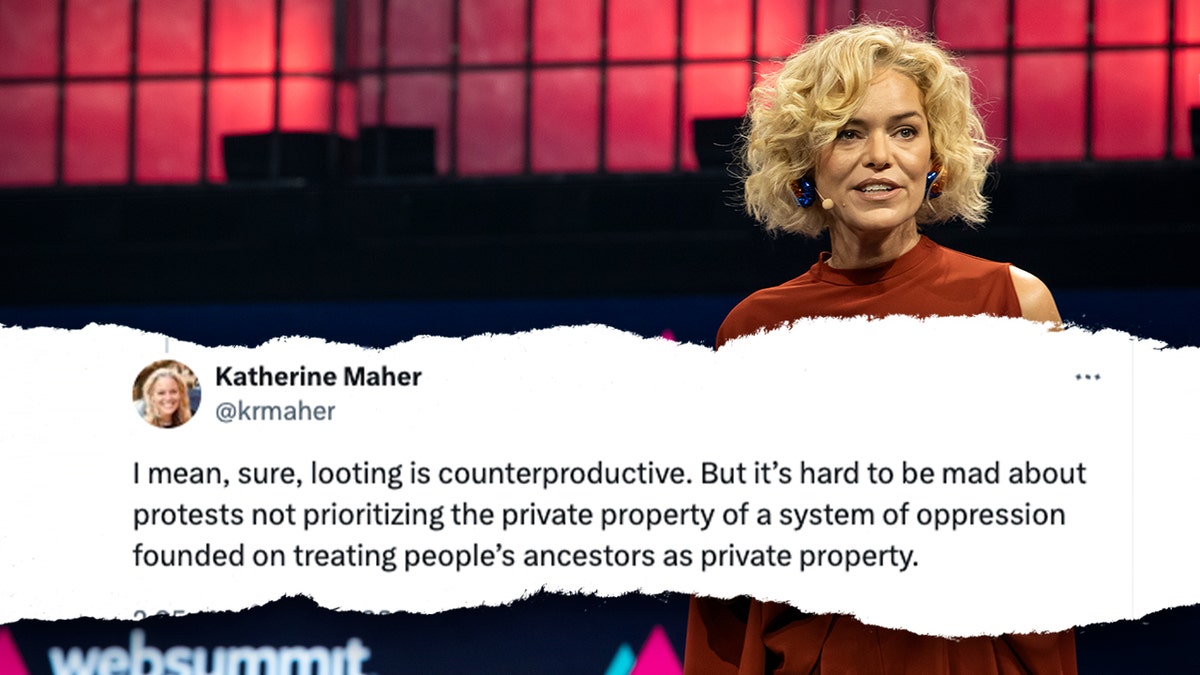Uri Berliner resigns from NPR after exposing the organization's liberal bias
Fox News' Mike Emanuel provides details on former NPR editor Uri Berliner's statement regarding his resignation.
NPR is taking heat from the Gray Lady.
The New York Times published a lengthy piece Wednesday headlined, "Inside the Crisis at NPR," that renewed the harsh spotlight on "internal turmoil" at NPR and a conservative media watchdog feels the report is a "sure sign" that it’s a crisis indeed.
Earlier this month, longtime NPR editor Uri Berliner blew the whistle on liberal bias at the organization with a piece in The Free Press. He was suspended for his scathing takedown of his own employer, and then resigned, noting that he "cannot work in a newsroom where I am disparaged by a new CEO whose divisive views confirm the very problems at NPR I cited."
The story thrust discussions of liberal bias at NPR into the national zeitgeist, and put a focus on CEO Katherine Maher, who took over last month and has gone viral for past social media posts showing far-left personal views. But according to the Times, problems at NPR "extend far beyond concerns about its journalism."

Earlier this month, longtime NPR editor Uri Berliner blew the whistle on liberal bias at the organization with a piece in The Free Press. He later resigned. (Getty Images)
"Internal documents reviewed by The New York Times and interviews with more than two dozen current and former public radio executives show how profoundly the nonprofit is struggling to succeed in the fast-changing media industry. It is grappling with a declining audience and falling revenue — and internal conflict about how to fix it," Times reporters Benjamin Mullin and Jeremy Peters wrote.
"NPR’s traditional broadcast audience, still the bulk of its listenership, is in long-term decline that accelerated when the pandemic interrupted long car commutes for millions of people. The network has begun to sign up digital subscribers who pay for ad-free podcasts, but that business has lagged far behind that of its competitors," Mullin and Peters continued. "While NPR still has an audience of about 42 million who listen every week, many of them digitally, that is down from an estimated 60 million in 2020, according to an internal March audience report, a faster falloff than for broadcast radio, which is also in a long-term decline."
The Times reporters noted that a "yearslong push to diversify NPR’s staff" hasn’t boosted listeners as much as executives hoped and had "been a point of contention within the organization" long before Berliner blew the whistle.
"Making matters more complicated: NPR’s unusual leadership structure. NPR’s reach is the result of its hundreds of member stations around the country, many of which both pay NPR for its shows and produce their own. But the leaders of those member stations — who control NPR’s board — often have conflicting priorities and compete with the network for donors, making changes more difficult," Mullin and Peters wrote. "Together, the challenges raise questions about the long-term vitality of NPR."
NPR brass has defended the organization at all costs, gloating about the success of its podcasts to the Times. NPR also stood by Maher as her old social media posts were unearthed.
Maher told the Times that NPR wasn’t the only media company facing a challenging environment.
"The obstacles we face are real, but the quality of the programming and the integrity of the mission are also indisputable. They offer a strong basis from which to build our future," Maher told the Times.
NPR WHISTLEBLOWER URI BERLINER RESIGNS: ‘I CANNOT WORK IN A NEWSROOM WHERE I AM DISPARAGED’

NPR CEO and President Katherine Mahers old tweets about looting, her support for Hillary Clinton and Biden-Harris have resurfaced after she addressed Uri Berliners concerns about NPR in a letter to staff. ( (Photo by Rita Franca/NurPhoto via Getty Images), Screenshot/X/KatherineMaher)
The Times then dove into the history of NPR, which "sprang up in Washington in 1970 as an alternative to commercial media."
"Before long, NPR exploded. By 1983, it had nearly 300 stations and about eight million listeners. Today, more than 1,000 people work at NPR, and its audience of millions makes it one of the most influential media companies in the world," Mullin and Peters wrote. "But that growth has reversed course in recent years."
The Times reported that advertisements, billed as "corporate sponsorships" by NPR, generated $135 million in 2022 but plummeted by roughly 25% in 2023. As NPR’s podcasts took off in popularity, local advertisers scoffed at paying for commercials on member stations when they could reach the same audience through podcasts.
The Times also reported that NPR’s subscription bundle "lagged behind competitors’ subscription businesses."
"The scope of the shortfall became apparent early in 2023, when NPR’s leadership decided to cut about 100 positions to help make up for a $30 million budget deficit," Mullin and Peters wrote.
"I believe that public radio has five to seven years to reimagine itself before it’s simply unsustainable," said Eric Nuzum, a former NPR executive and co-founder of the audio consulting and production company Magnificent Noise told the Times. "And they can’t take two or three years of that time debating a business model."
The Times also dove into NPR’s "North Star," which is what former top executive John Lansing once called the outlet’s diversity push.
"NPR’s leaders redoubled their efforts to diversify their audience and work force and closely tracked metrics for each. They added podcasts aimed at people of color and younger listeners. They promoted people of color to high-profile reporting and hosting jobs. All of these moves were meant to ensure the nation’s public radio network would remain competitive as the country’s population continued to grow more diverse," Mullin and Peters wrote.
"So it came as a disappointment to some people on NPR’s board last fall when they were presented new internal data showing their efforts hadn’t moved the needle much with Black and Hispanic podcast listeners," they added, noting that the percentage of Black NPR listeners has essentially gone unchanged since 2020.
The Times also noted that the diversity push caused infighting at NPR, and handed critics a reason to slam the company.
"Still, some critics of NPR believe NPR’s ‘North Star’ strategy has failed for a completely different reason: It has not taken ideological diversity into account," Mullin and Peters wrote.
One of the critics was inside the house, as Berliner detailed his employer’s "absence of viewpoint diversity" in his stunning rebuke. He wrote that registration records in 2021 showed an astonishing disparity between Democrats and Republicans in the NPR newsroom and said staffers worried certain reporting would help former President Trump, among other things, indicating an "open-minded spirit no longer exists" at NPR.
5 THINGS VETERAN NPR EDITOR EXPOSED IN STUNNING CRITICISM OF OWN EMPLOYER’S LIBERAL BIAS
A former high-level NPR executive felt a "real problem" was identified in Berliner’s scathing piece.
"I’m not surprised because he’s a very thoughtful and forthright guy," an ex-NPR executive who worked with Berliner told Fox News Digital on the condition of anonymity.
Media Research Center executive editor Tim Graham believes the Times piece is evidence that a significant issue is occurring at NPR.
"One sure sign that NPR is having a crisis is that it's talking to The New York Times about how it's having a crisis," Graham told Fox News Digital.
"Quoting a former executive who says he gives them five-to-seven years to save everything will raise some eyebrows," Graham added. "One obvious answer to this is that the ‘media’ has changed dramatically since 1970 and there's no urgent need today for government subsidies for a so-called ‘public’ radio network that narrowcasts to liberal Democrats."
Graham did take issue with part of the Times’ piece.
"The Times account isn't acknowledging that NPR has a bias problem. They're not repeating Berliner's point that the NPR audience is now 67 percent liberal or very liberal. The reporter lets NPR CEO Katherine Maher insist ‘the quality of the programming and the integrity of the mission are also indisputable’ when that is very much in dispute. The story ends with NPR founder Bill Siemering insisting NPR is an ‘independent source of information that reflects the culture in a meaningful way where all the voices are heard,’ which is simply a lie. Conservative voices are rarely heard, and when they are, it's often in hostile interviews or negative stories," Graham said.
NPR EDITOR'S BOMBSHELL ESSAY CAUSING 'TURMOIL' AT LIBERAL OUTLET: REPORT
"Berliner's critique of the tilt of programming has been filtered through NPR employees insisting it's filled with errors or omissions, but no one really makes NPR employees try to defend specific examples of controversial decisions like dismissing the Hunter Biden laptop as not a ‘real story,’ as a ‘pure distraction.’ How did that turn out?" Graham asked.
"The Times story does underline that NPR has failed to increase its audience among Black and Latino Americans, even as it's tried aggressively to push narratives of systemic racism," he continued. "The anecdote where NPR's last CEO called for ‘civility’ in an internal conversation and a Black podcast producer called that a ‘racist dog whistle’ is really indicative of how the DEI attempts just draw more complaints of White racism."
The New York Times did not immediately respond to a request for comment.
Graham believes "NPR has done nothing to discourage Republican voters and legislators from moving to defund NPR," so it "can be financially supported by the left -- the only audience they really care about pleasing."
NPR did not immediately respond when asked about the Times piece.













































